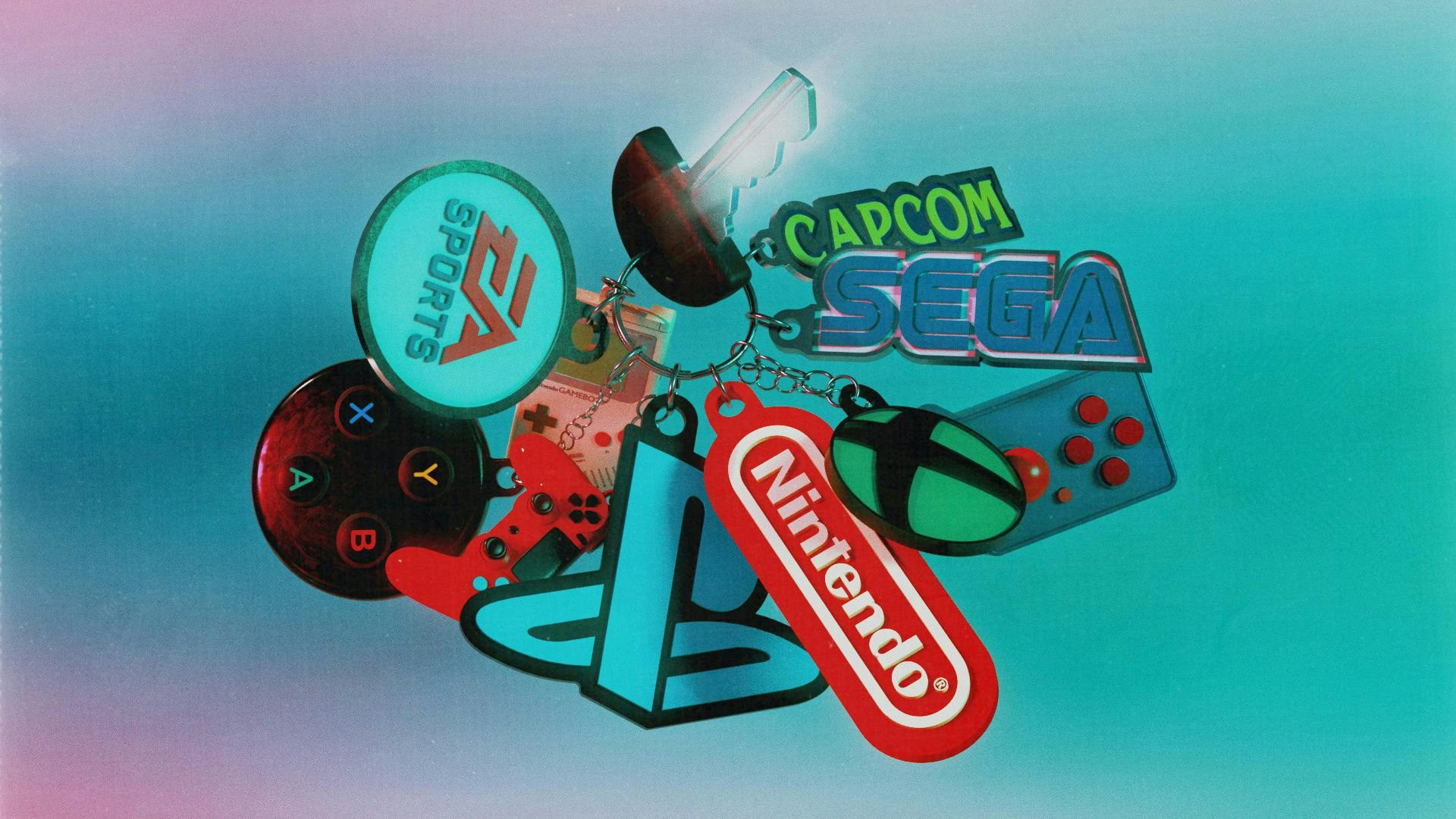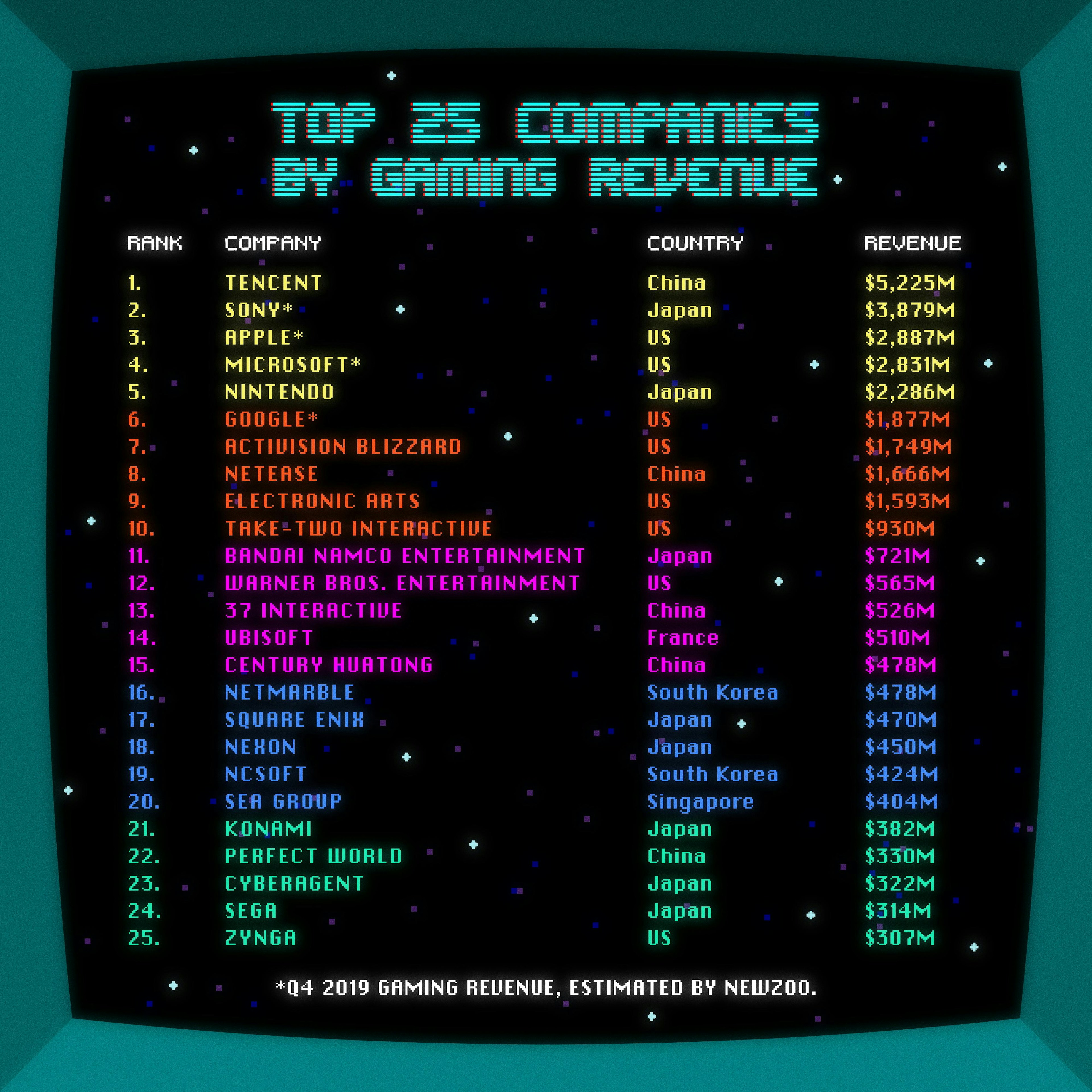Who Owns the Games Industry, and What Lies Ahead?

CATEGORIES
GamingA quick look at the chart on this page reveals some familiar names: Sony, Microsoft, Nintendo, Electronic Arts, Activision, Capcom—companies we know and (sometimes) love, stalwart bastions of the gaming industry for decades. Yet the list of the top 25 companies in the video game world—in terms of revenue generated directly from games—throws up a fair few surprises.
Sea Group? 37 Interactive? CyberAgent? These are hardly household names in the US and Europe, yet they are all industry behemoths. Their appearance on the list shows not only that video games are a global phenomenon, but that some of the real power in the industry lies with companies one might not regularly hear about in gaming news.
The top 25 companies in the games industry

The data in the infographic, compiled by market analyst Newzoo, focuses solely on revenue from video games in a single quarter (Q4 2019). Hardware sales and non-game sales have been stripped out, as has revenue from other parts of each company, unrelated to gaming. This means we can compare companies solely on clout in terms of video games sold.
Note: Estimates from Newzoo. Newzoo is a private enterprise that does not reveal its calculation criteria, and should not be interpreted as definitive.
The console makers
Unsurprisingly, Sony, Microsoft and Nintendo feature near the top of the charts. Even with the sales of consoles stripped out, they’re still comfortably ahead of the pack—thanks in large part to sales through their respective online storefronts, from which they take a 30 percent cut on average. Of course, each company publishes games made by a raft of top-tier developers that they either own, or in which they possess a majority stake in. Sony, for example, owns more than a dozen game studios, including Polyphony (Gran Turismo), Insomniac Games (Spider-Man) and Naughty Dog (The Last of Us).
Microsoft lagged behind Sony in terms of in-house game exclusives in the previous console generation, but in the past two years, the Redmond, Washington-based company has gone on something of a buying spree. Since 2018, Microsoft acquired more than a half-dozen major studios, including Ninja Theory (HellBlade) and Obsidian Entertainment (The Outer Worlds, Pillars of Eternity), culminating in the industry-shaking acquisition of ZeniMax Media in September 2020 for $7.5 billion. This purchase included the Fallout and Elder Scrolls publisher/developer Bethesda, and studios such as MachineGames (Wolfenstein), id Software (DOOM) and Arkane (Dishonored).
These purchases are undoubtedly part of a strategy to pad out Xbox’s Game Pass service—the closest thing we have to a "Netflix for games"—with exclusive titles. Game Pass is likely to be the key differential between Sony and Microsoft’s console offerings over the next generation, and it will be interesting to see whether Sony enhances its PlayStation Now service to compete. Currently, Sony’s service focuses more on legacy games, rather than providing new games on the day of release, as Game Pass does.
Nintendo, as always, ploughs its own furrow. Almost all its major games, like the Mario, Zelda and Animal Crossing titles, are developed by in-house teams, often under a veil of secrecy. The company does own a few external studios, such as Monolith Soft (Xenoblade Chronicles) and Retro Studios (Metroid Prime), but generally keeps development teams under the Nintendo roof.
Interestingly, although its smash-hit Pokémon games have almost always been published on Nintendo consoles, Nintendo only owns a 33 percent stake in The Pokémon Company—something that took over-eager investors a while to realise, following the runaway success of Pokémon Go.
US dominance
Eight of the top 25 companies—and six of the top 10—are based in the United States. It is unsurprising to find Apple and Google in the top echelons, thanks to hefty revenues generated by their mobile app stores (we shall discuss mobile gaming in more depth). Then there are the big four US games publishers: Activision Blizzard, Electronic Arts, Take-Two Interactive and Warner Bros.
Activision Blizzard was founded in 2007 through a merger between Activision and Vivendi Games, owner of Blizzard Entertainment—although relations between the two merged companies have allegedly been frosty at times. Activision’s key franchises include Crash Bandicoot, and the perennial Christmas best seller Call of Duty (with each instalment selling tens of millions of copies). Blizzard has created multi-million-selling series like World of Warcraft, StarCraft, Hearthstone and Diablo. Activision Blizzard also owns mobile developer King, which we’ll cover further on.
Electronic Arts has been around for almost as long as Activision. It was founded in 1982, three years after a group of disgruntled Atari developers founded Activision, and the two publishers have been jockeying for dominance since. EA’s portfolio is heavy on sports titles, including the FIFA, John Madden and NHL licences, and the microtransaction-based Ultimate Team modes in these games have been a huge breadwinner for the company. In September, EA reported that the Ultimate Team player base had grown to 30 million, up 25 percent year-on-year. EA also gained the Star Wars licence in 2013, but has so far only released four major games based on the IP. One, Star Wars Battlefront 2, was mired in controversy over its loot box mechanics.
Loot boxes—or "surprise mechanics," as one EA spokesperson euphemistically called them—continue to cause problems for the firm, with Belgium declaring them gambling and subsequently banning the sale of FIFA points, used to buy "surprise" players in Ultimate Team mode. The publisher also owns a slew of other successful franchises, including Apex Legends, Battlefield, The Sims, Need For Speed, Dragon Age and Mass Effect.
Take-Two Interactive is also known for sports titles. Its NBA 2K series regularly sells in huge numbers, with NBA 2K20 shifting a record-breaking 12 million units. Again, the game features controversial loot boxes, something the firm took considerable flak for. However, Take-Two’s crown jewel is the Grand Theft Auto series made by Rockstar: Grand Theft Auto V sold more than 130 million units since 2013, making it among the biggest-selling games of all time, and it continues to regularly appear in the charts to this day. Take-Two owns a number of other perennially successful franchises, including the Red Dead games, Civilization, XCOM and Borderlands.
The Warner Bros. portfolio is heavily focused on film, comic and toy licences, including games based on Batman, Harry Potter, The Lord of the Rings and LEGO. It owns a slew of major studios, including Rocksteady (Batman: Arkham Knight), Avalanche (working on the upcoming Hogwarts Legacy) and TT Games (the studio behind the LEGO franchise). Recently, rumours swirled that parent company AT&T was looking to put Warner Bros. Interactive Entertainment up for sale, but AT&T seemingly reversed its decision in August, with insiders noting expectations of growth in the division.
Japan cedes its position
Japan is home to eight of the top 25 video game companies. But whereas Japanese publishers dominated the gaming landscape in the 1980s and 1990s, its leading position has been largely usurped by firms in the US and China. Bandai Namco and Square Enix in particular continue to do well, and Capcom, although far outside the top 25, resurged in recent years on the back of its internationally popular Monster Hunter and Resident Evil franchises.
Bandai Namco sits just outside the top ten. Many of its franchises are aimed squarely at the Japanese market, including games based on licences like Gundam, Dragon Ball, Sword Art Online and Naruto. But it has also seen considerable international success with the Soul Calibur, Ridge Racer, Tekken, Pac-Man and Dark Souls series.
Square Enix, meanwhile, has always been known for blockbuster role-playing games (RPGs) like Final Fantasy, Dragon Quest and Kingdom Hearts. But it also publishes best-selling action franchises like Tomb Raider, Deus Ex and Just Cause. In 2005, company absorbed Taito, the studio behind arcade classics like Space Invaders and Bubble Bobble, and in 2009 it took over UK publisher Eidos, acquiring the rights to games like Tomb Raider and Thief.
Konami was a powerhouse in the 8-bit and 16-bit eras, creating ever-popular franchises like Castlevania, Contra and Metal Gear. But the company drifted from console games in recent years, with the CEO declaring in 2015 that mobile games are the future. Sega is likewise not the powerhouse it was in the 1990s, when its consoles went toe-to-toe with Nintendo’s. But since Sega exited console development in the early 2000s, after the failure of Dreamcast, the company steadily reinvented itself as a publisher of note, acquiring developers like Creative Assembly (Total War series), Relic Entertainment (Company of Heroes), Atlus (Persona series) and Sports Interactive (Football Manager series).
Europe lags behind
Although a huge number of leading game developers, like Rockstar and DICE, have offices in Europe or are solely based there, the continent has a lack of mega-corps that can hold their own with the giants of Japan, China and the US. Ubisoft is the sole European company in the top 25, with a raft of successful franchises to its name, such as Assassin’s Creed, Watch Dogs, Far Cry, Just Dance and the Tom Clancy’s games.
CD Projekt, valued at $6.8 billion, is the second-largest video games company in Europe. The Polish studio is behind the Witcher games and Cyperpunk 2077.
The rise of China
Some may be surprised to see a China-based company ranked as the number-one video game company in the world. But the rise of Tencent to the top reflects the ascent of Chinese gaming companies across the board, with China taking five places in the top 25.
Tencent swept past EA and Activision to become the biggest games publisher in the world in 2013. Its rapid growth is chiefly due to the huge expansion of the games market in China, yielding sales revenue of 230 billion yuan ($35 billion) in 2019, up tenfold over a decade. The console sector is relatively tiny in the country—a government ban on gaming consoles was lifted in 2015—so the gaming market there is almost entirely focused on mobile and PC. Per Statista, over 366 million smartphones were shipped in China in 2019, around 27 percent of the global total. There are an estimated 640 million gamers in the country.
It is not easy for foreign game companies to access that huge market. Strict government rules dictate that companies need a licence before they can release a game in China, and few such licences are granted to overseas firms. In addition, a nine-month freeze on granting licences in 2018 meant China was closed to new games for the best part of a year. In this environment, domestic game publishers like Tencent, NetEase, Century Huatong, 37 Interactive and Perfect World are able to clean up.
Chinese firms have also been on a buying spree, snapping up stakes in game developers worldwide, or purchasing them outright. Tencent owns more than 81 percent of Supercell (Clash of Clans), 40 percent of Epic Games (Fortnite), 80 percent of Grinding Gear Games (Path of Exile) and 100 percent of Riot Games (League of Legends), plus 5 percent of Activision Blizzard and Ubisoft. Meanwhile, NetEase paid $100 million for a minority stake in Bungie (Destiny) in 2018 and bought a minority stake in Quantic Dream (Detroit: Become Human) in 2019.
Mobile and online games dominate
Around 96 percent of the games launched in China in 2019 were mobile games, and in 2019, worldwide revenue from mobile games was more than $68 billion, accounting for around half of the total games market. In short, mobile games are huge; unsurprisingly, some of the top 25 companies derive a large portion of income from this sector.
The Japanese company CyberAgent (number 23 in the chart) formed in 1998, chiefly as a digital advertising and media company, but it created the Cygames development studio in 2011. Cygames is responsible for several huge mobile hits, notably the 2014 RPG Granblue Fantasy, which grossed 28.1 billion yen ($270 million) in 2019 alone. Yet even that tidy sum is eclipsed by some of the huge figures brought in by entries in the 2019 top ten mobile games by overall revenue.
First place went to Honor of Kings from Tencent, grossing an eye-watering $1.5 billion in 2019. Tencent also profited from the 8th-placed Clash of Clans, thanks to its majority stake in developer Supercell. South Korean company NCSoft is behind the 7th-placed Lineage M, while King (owned by Activision Blizzard) is behind fourth-placed Candy Crush Saga, and NetEase developed 10th-placed Fantasy Westward Journey. Several other firms in the top 25 also derive a large portion of income from mobile gaming, like Netmarble (Lineage 2: Revolution) and Sea Group (Garena Free Fire).
Online multiplayer games are also significant. Superdata ranked the Tencent-owned League of Legends (published in Southeast Asia by Sea Group) as the highest-grossing PC game in September 2020, while Nexon and NCSoft back some hugely popular massively multiplayer RPGs, like MapleStory (Nexon), Dungeon Fighter Online (Nexon) and Lineage (NCSoft).
Future market directions
How will the top 25 change in coming years? It’s safe to say that console makers Nintendo, Sony and Microsoft will maintain high positions, especially with the launches of the next-generation Xbox Series X/S and PS5. It is worth observing whether Microsoft’s disruptive Game Pass strategy allows it to pull ahead of Sony. Nintendo’s Switch handheld/console hybrid has been a massive success for the company, and this success looks set to continue, judging by phenomenal sales in 2020. The company is also rumoured to be working on an upgraded Switch model for release in 2021.
Chinese companies will continue to rise to dominance as China’s gaming market expands. The sector is expected to be worth around $46 billion by 2024. And Perfect World, which already distributes the hugely popular (and hugely lucrative) MOBAs Dota2 and Counter Strike in China, collaborated with Valve to launch a version of Steam for the Chinese market, a huge windfall for the company. Chinese games are also becoming huge hits in western countries: Genshin Impact from miHoYo was released worldwide on PS4, PC and mobile in September 2020, and grossed more than $239 million on mobile alone in October, 19 percent of which was from the US market.
Video game streaming could be another game changer in the years to come. Google has its Stadia streaming service, though it was hamstrung by a punitive pricing model and a lacklustre launch. Despite this, the service is improving, and as internet speeds and reliability improve worldwide, streaming represents a major growth market. Microsoft has its xCloud streaming service, now integrated into Game Pass Ultimate, and Amazon announced its Luna game streaming service in September 2020. Early access was granted this year, and the company is slowly building a competitive base of titles as it prepares its larger rollout.
We are also likely to see further consolidation across the gaming sector. Aside from the on- and then off-again proposed sale of Warner Bros., Ubisoft only narrowly avoided a takeover bid by Vivendi in 2018, and elsewhere it’s likely that small and mid-sized game developers and publishers will continue to be absorbed by the big guns. We could also see new entrants. Disney exited game development in 2016, but it’s not unreasonable to expect that the company might make a return. (Warren Spector certainly wishes they would.)
One shadow looms over the horizon ... and that is loot boxes. Belgium has already banned these controversial mechanics, and the UK House of Lords urged for them to be reclassified as gambling (problem gambling is something to which the mechanism has recently been successfully linked). Meanwhile, EA faces class action lawsuits in the United States in connection with its Ultimate Team loot boxes.
If regulators in the US, UK and elsewhere begin to clamp down on these techniques, it could massively impact the bottom lines of exposed companies like EA and Take-Two, as well as the mobile market in general, where many games rely on luck-based "gacha" mechanics. The next few years shall be very interesting indeed.
30 Apr 2021
-
Lewis Packwood
Illustrations by Debarpan Das.
DATA-DRIVEN TECH & SOCIAL TRENDS. DISCOVERED WEEKLY. DELIVERED TO YOUR INBOX.
02/03
Related Insights
03/03
L’Atelier is a data intelligence company based in Paris.
We use advanced machine learning and generative AI to identify emerging technologies and analyse their impact on countries, companies, and capital.

